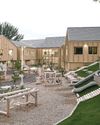
I GREW UP IN SKEETCHESTN, a small riverside community northwest of Kamloops, British Columbia, in a home with no running water and no power. My family used fire for everything: to cook, to heat bathwater and to dry our clothes. Fire also served a ceremonial purpose for my people—in sweat lodges, at funerals and as a spiritual offering. Elders would often tell me stories about how, for centuries, Indigenous people across Canada set fire to the earth, so it would look after us in return. These cultural burns, as we call them, were a tool for land management. In the cool of early spring and late fall, fire keepers would light controlled burns using pitchwood or handfuls of long grass, renewing the soil where berries and other medicines grew and cleansing forests of invasive plant and animal species. Most importantly, these burns would incinerate needles, branches, seeds and other debris dropped on the ground by dead and dying trees—fuel just waiting for a spark.
After settlers arrived out west in the 18th century, British Columbia became the first province to outlaw cultural burning, kicking off a countrywide colonial policy of Smokey Bear–style suppression that has only grown more dangerous over time. By banning a practice proven to remove fuel build-up on a regular basis, governments have made larger areas of the country more susceptible to catastrophic wildfires. I’ve worked as an emergency firefighter with the B.C. Wildfire Service since 1982, and back then, I regularly fought fires that averaged about 100 to 200 hectares in size. By 1994, fires spanning well over 20,000 hectares were burning in the province every year, and in 2017, during a very hot summer, a million hectares went up in flames when three massive blazes converged on the Chilcotin Plateau.
هذه القصة مأخوذة من طبعة August 2023 من Maclean's.
ابدأ النسخة التجريبية المجانية من Magzter GOLD لمدة 7 أيام للوصول إلى آلاف القصص المتميزة المنسقة وأكثر من 9,000 مجلة وصحيفة.
بالفعل مشترك ? تسجيل الدخول
هذه القصة مأخوذة من طبعة August 2023 من Maclean's.
ابدأ النسخة التجريبية المجانية من Magzter GOLD لمدة 7 أيام للوصول إلى آلاف القصص المتميزة المنسقة وأكثر من 9,000 مجلة وصحيفة.
بالفعل مشترك? تسجيل الدخول

A Teacher's Tale
My career in Quebec ended because I chose to keep my hijab

Top Marks
InSaguenay, Quebec, Ecole de l'Etincelle embodies the school of the future

Modernize Parental Leave
Canada's birth rate is dropping, and the cost of living is partly to blame. A more supportive leave plan would make parenthood more affordable

"I spent years trying to learn English.Now I use ChatGPT."
AI isn't perfect, but it helps me write complex emails and understand Canadian culture

MY PREDICTION - The National School Food Program Will Transform Kids' Health
When students have access to nutritious food, they do better in school and life

FOOD
The exorbitant cost of food will have ripple effects on the restaurant industry and grocery stores. The good news? There's a plan to save the country's salmon supply.

MY PREDICTION - New Mortgage Rules Will Drive Up Housing Prices
Looser lending policies will encourage more people to buy homes they can't afford in the first place

HOUSING
Politicians will spar over how to tackle the housing crisis. Falling interest rates will draw young people into the real estate market. And a rude awakening is coming for homeowners renewing mortgages.

MY PREDICTION - Stuctured Literacy Will Help Level the Educational Playing Field
Canadian students have struggled to read and write. That stops this year.

EDUCATION
Quebec's classrooms will take centre stage in the secularism debate. Chatbots will help students create A-plus work, while others will grade themselves. And thousands of international students will be sent home.